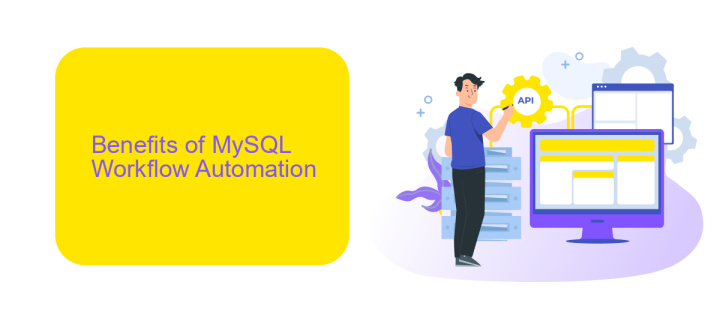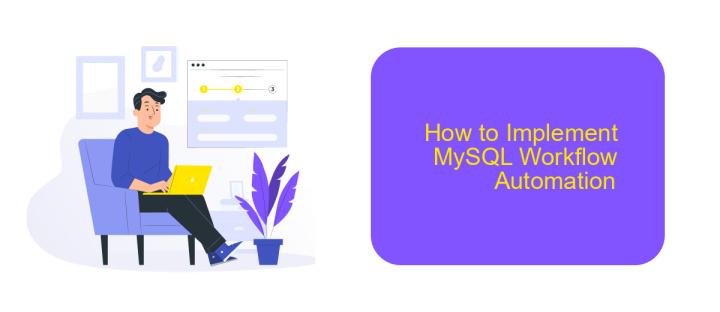MySQL Workflow Automation
MySQL Workflow Automation streamlines database management by automating repetitive tasks, enhancing efficiency, and reducing the potential for human error. This powerful tool allows for seamless integration with various applications, enabling real-time data updates and improved workflow processes. Discover how MySQL Workflow Automation can transform your database operations, saving time and resources while ensuring data accuracy and consistency.
Introduction to MySQL Workflow Automation
MySQL Workflow Automation is a powerful approach to managing and optimizing database tasks. By automating repetitive processes, organizations can save time, reduce errors, and improve overall efficiency. This technique is especially beneficial for businesses that rely on MySQL databases for their operations, as it ensures data integrity and consistency.
- Automated data backups and recovery
- Scheduled maintenance tasks
- Real-time data synchronization
- Seamless integration with other systems
One of the key aspects of MySQL Workflow Automation is the ability to integrate with various tools and services. For instance, ApiX-Drive offers robust solutions for setting up integrations, allowing businesses to connect MySQL with other applications effortlessly. This integration capability ensures that data flows smoothly between systems, enabling more streamlined and automated workflows. By leveraging such services, organizations can enhance their MySQL operations and achieve greater productivity.
Benefits of MySQL Workflow Automation

MySQL workflow automation offers significant advantages by streamlining database management tasks, thereby reducing the likelihood of human error. Automated workflows can handle routine operations such as data backups, updates, and migrations, ensuring these tasks are performed consistently and without manual intervention. This not only saves time but also enhances the reliability and integrity of the database, allowing businesses to focus on more strategic activities.
Moreover, integrating MySQL with other tools and services can further enhance its functionality. For instance, using services like ApiX-Drive can facilitate seamless integration between MySQL and various applications, enabling automated data transfers and synchronization. This level of automation ensures that data remains up-to-date across all platforms, improving the overall efficiency and productivity of business processes. By leveraging MySQL workflow automation, organizations can achieve a more agile and responsive data management system, ultimately driving better business outcomes.
Use Cases for MySQL Workflow Automation

MySQL workflow automation can significantly streamline various business processes, enhancing efficiency and reducing manual workload. By automating repetitive tasks, companies can focus on more strategic activities, leading to overall growth and productivity.
- Data Synchronization: Automate the synchronization of data between MySQL databases and other systems, ensuring real-time updates and consistency across platforms.
- Reporting and Analytics: Schedule automated reports and data analysis, providing timely insights without the need for manual data extraction and processing.
- Backup and Recovery: Implement automated backup processes to ensure data integrity and quick recovery in case of system failures.
- Integration with Third-Party Services: Use tools like ApiX-Drive to automate the integration between MySQL and various third-party applications, enhancing workflow efficiency.
- Alerting and Monitoring: Set up automated alerts for specific database events or performance metrics, enabling proactive issue resolution.
By leveraging MySQL workflow automation, businesses can achieve a seamless and efficient operational environment. The integration capabilities provided by services like ApiX-Drive further enhance the automation potential, allowing for a more connected and responsive infrastructure.
How to Implement MySQL Workflow Automation

Implementing MySQL workflow automation can significantly streamline your database management tasks, reducing manual effort and minimizing errors. The first step involves identifying the repetitive tasks that can be automated, such as data backup, report generation, or user notifications. Once these tasks are identified, you can proceed to set up the automation tools and scripts.
One effective way to automate MySQL workflows is by using integration services like ApiX-Drive. This platform allows you to connect MySQL with various other applications, enabling seamless data transfer and automated workflows. By leveraging such services, you can ensure that your MySQL database interacts efficiently with other tools in your tech stack.
- Identify repetitive tasks suitable for automation.
- Set up automation tools and scripts.
- Use integration services like ApiX-Drive for seamless connectivity.
- Test and monitor the automated workflows for optimal performance.
By following these steps, you can effectively implement MySQL workflow automation, enhancing productivity and ensuring your database operations run smoothly. Continuous monitoring and optimization are essential to maintain the efficiency of the automated workflows.
Best Practices for MySQL Workflow Automation
Implementing MySQL workflow automation requires careful planning and adherence to best practices to ensure efficiency and reliability. Begin by clearly defining your objectives and identifying repetitive tasks that can be automated. Establish a robust backup strategy to protect your data, and regularly test your backups to ensure they can be restored successfully. Use version control for your scripts and configurations to track changes and facilitate collaboration among team members.
When setting up integrations, consider using services like ApiX-Drive to streamline the process. ApiX-Drive allows you to connect various applications and automate data transfers without requiring extensive coding knowledge. Ensure you monitor your automated workflows regularly to identify and resolve any issues promptly. Implement logging and alerting mechanisms to stay informed about the status of your workflows. Finally, continuously review and optimize your automation processes to adapt to evolving business needs and improve overall performance.
- Automate the work of an online store or landing
- Empower through integration
- Don't spend money on programmers and integrators
- Save time by automating routine tasks
FAQ
What is MySQL Workflow Automation?
How can I automate data synchronization between MySQL and other applications?
Is it possible to automate MySQL backups?
What are the benefits of automating MySQL workflows?
Can I integrate MySQL with cloud-based services for automation?
Strive to take your business to the next level, achieve your goals faster and more efficiently? Apix-Drive is your reliable assistant for these tasks. An online service and application connector will help you automate key business processes and get rid of the routine. You and your employees will free up time for important core tasks. Try Apix-Drive features for free to see the effectiveness of the online connector for yourself.


